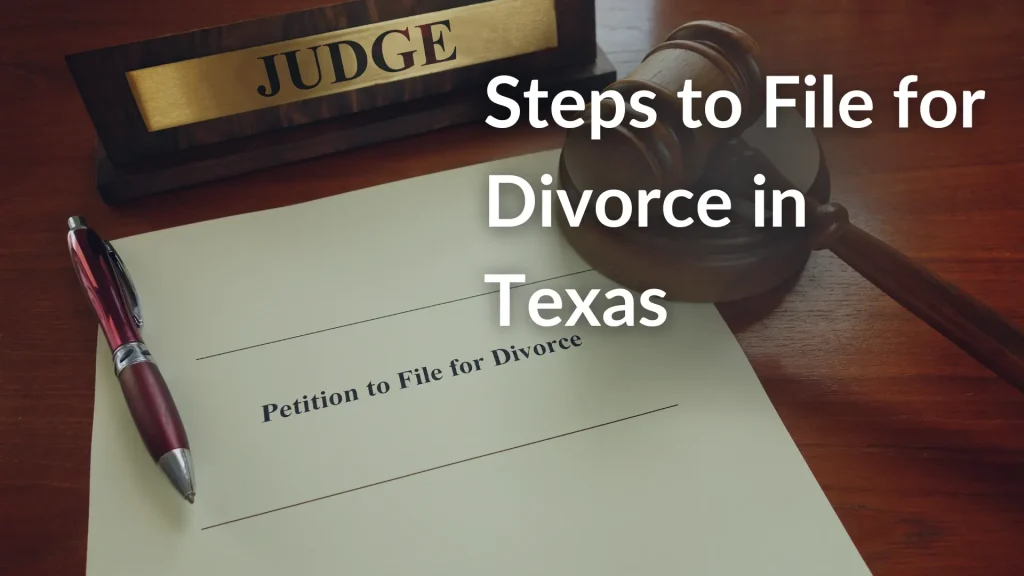
Divorce is a significant life decision that can be stressful and challenging for the parties involved. Understanding the divorce process can make things easier and ensure you do what is legally necessary to dissolve the marriage. Higdon, Hardy & Zuflacht, L.L.P.’s step-by-step guide can help you navigate how to file for divorce and protect yourself in Texas.
Who Can File for Divorce in Texas?
Either spouse can file a divorce petition in Texas, but there are residency requirements. Where to file for divorce depends on where you live.
Spouses can file for divorce in the county district court where either party has resided for the previous 90 days. They must also have lived in Texas for at least six months.
One spouse can still file in Texas if they live out of state or out of the country. They must file in the county where the other spouse lives, as long as that spouse has resided in Texas for six months. This is especially true when filing a divorce without children, which can simplify the process but still requires following the proper legal steps and understanding the divorce timeline. Hence, you know what to expect from start to finish.
Step-by-Step: How to File for Divorce in Texas
The divorce decree process can be complex. This step-by-step guide on how to file for divorce in Texas can help you get started:
Determine the grounds for divorce
You must include a reason for your divorce with your divorce petition. Texas law recognizes the following seven grounds for divorce:
- Insupportability (“irreconcilable differences”)
- Cruelty
- Adultery
- Conviction of a felony
- Abandonment
- Living apart (separation of three-plus years)
- Confinement in a mental hospital
File for divorce
Once you determine grounds, you must file your petition for divorce using the proper court-approved divorce forms. You must also pay the filing fee for divorce in Texas.
Serve the divorce papers.
The spouse filing for divorce (the petitioner) must serve the other spouse (the respondent) with divorce papers. Serving divorce papers in Texas is an official act. A constable, sheriff, or another authorized by the court or law must serve the documents in person or by certified mail before the judge can make a divorce ruling.
If you cannot locate your spouse, you must prove this to the court. The court may allow you to serve by posting a notice in the courthouse or publishing a notice in the newspaper.
Wait for an answer from your spouse.
The respondent must answer the divorce petition. In an uncontested divorce in Texas, the respondent usually signs and returns the Final Decree of Divorce, which is included with the divorce papers.
In a contested divorce, the respondent answers the divorce petition but does not sign a final decree. Instead, the respondent often files a Counter-Petition for Divorce outlining what they would like in the divorce.
A contested divorce process involves mediation or Texas family court proceedings to determine important issues, such as spousal support or child custody.
If your spouse does not answer your divorce petition within the time allotted by the court, you can get a default divorce in Texas. In a default divorce, your spouse will likely be unable to have a say on the division of property, debts, and possibly issues involving children.
Finalize the divorce
Finalizing a divorce in Texas requires a hearing. However, unless there was family violence, there is a Texas divorce waiting period. A judge cannot finalize a divorce until at least 60 days after filing the divorce petition.
Once the judge issues the final divorce decree and both parties sign it, it is a binding legal agreement. If your ex-spouse does not adhere to the decree’s terms, you have two years to file a lawsuit to enforce it.
Special Considerations in a Texas Divorce
 There are some things to consider when filing for a divorce in Texas:
There are some things to consider when filing for a divorce in Texas:
- Texas is a community property state – When dividing property in a Texas divorce, the court assumes that anything the spouses had during the marriage is community property. If a spouse wants the court to designate separate property, they must provide proof of separate ownership.
- Child custody – Child custody in a Texas divorce is called “conservatorship.” Like most states, Texas prefers to give parents joint conservatorship, but will award sole conservatorship when it is in a child’s best interests.
- Durational spousal support – “Spousal maintenance” or “alimony” is limited by the length of the marriage. Texas law states that the maximum duration of support for a marriage lasting less than 10 years is five years. The maximum duration is seven years for marriages lasting 10 to 20 years. The maximum duration for marriages lasting 30 or more years is 10 years.
Contact Higdon, Hardy & Zuflacht, L.L.P. Today
Divorce is complex, but our law firm can guide you. Our team is here to help you understand your rights and take the first step toward securing the necessary benefits. Contact Higdon, Hardy & Zuflacht, L.L.P. to learn more about filing for divorce in Texas and how our divorce attorneys in Texas can help you. Complete our online form or call (210) 349-9933 today.


